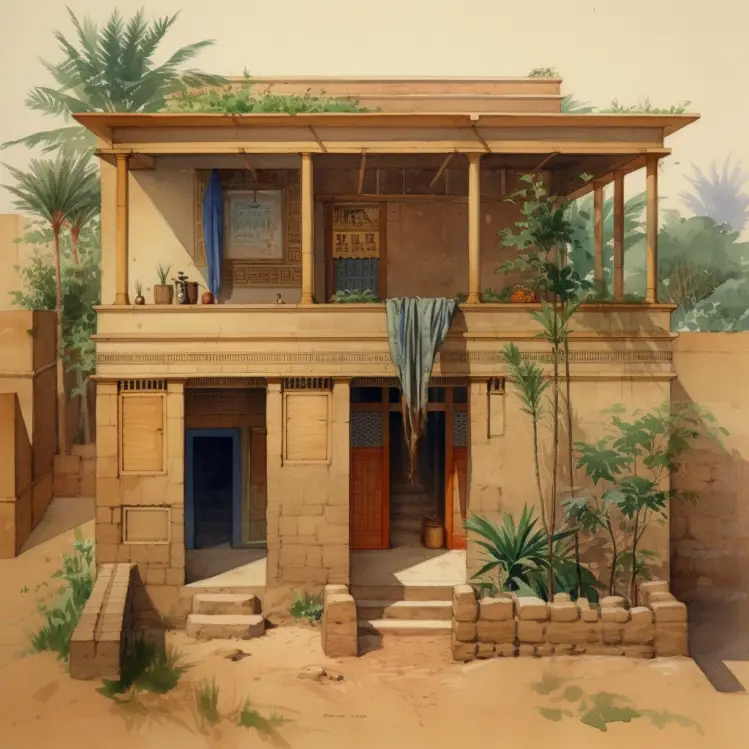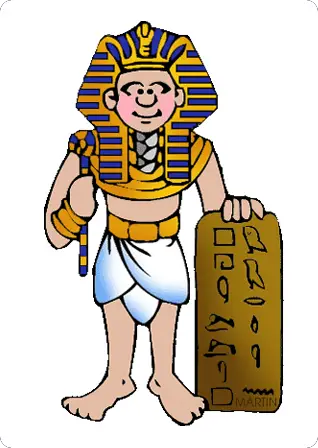Egyptian Houses
Almost all of Egypt is a desert, and in ancient Egypt, they needed to use any fertile land for growing crops.
This means that there weren’t that many trees for building houses. The Egyptians had to use whatever they had around and that included mud and reeds.
Since the Nile River floods lasted three months out of the year, their housing construction often suffered.

Ancient Egyptian Homebuilding Innovations”
Early in Egyptian history, the people made huts for their houses out of mud and papyrus reeds (a local plant). Since the Nile River would flood every year, it would wash away the mud huts.
They decided to start using the mud to create bricks, which were stronger than just plain mud.
The bricks were created by mixing up mud with straw, placed in a form, and then left in the sun to bake and dry. When they stacked the bricks up, they could make stronger walls and homes.
They also learned to build the homes so that it allowed the outside wind to keep the houses cool.
Ancient Egyptian Homes: Inequality Reflected in Bricks and Gates

Poor people had homes that usually had only one row of bricks, but the wealthier people often had two or even three rows of bricks.
The mud bricks were cheap to make, but they found out that in a couple of years, they started to crumble. The very richest people had enough money to have homes made out of stone and also had granite stone gateways.
Most of the houses had three rooms and all of the homes had flat roofs. The stone gateways were common for both rich and poor houses and they had the ability to be locked from the inside.
Archeologists have found ancient keys that dated back to 1550 BCE. Poor people had gateways that were usually made out of limestone.
Two-Storey Living, Courtyards, and Gardens for the Wealthy

As the Egyptian civilization developed, they began to build houses with two floors. Usually, the top floor was where they lived and the bottom floor was used for crop storage.
They created reed canopies to give them shade against the hot Egyptian sun and even had small windows for the upper rooms.
All windows and doors had reed mat coverings to keep flies, dust and heat out.
Many of the homes of wealthy people were built so that they had a courtyard in the center.
These courtyards had areas to grow fruits and vegetables as well as flower gardens. Some of these homes had indoor toilets and bathrooms.
Sewage from all of the people’s houses was eliminated by digging cess pits as well as tossing it into the streets or the river.
Beginning in the time of the New Kingdom a number of rich people had their own private wells for their drinking water.
The poor people had to use shared public wells that were found throughout the towns, and some had to use the Nile River water or water from canals.
Simple Interiors with Minimal Furnishings

The inside of the ancient Egyptian homes was not furnished with wood furniture like we have today.
Most families had low stools and the very poor just sat on the floor. The homes of the wealthy had beds and even mattresses, but the poor people had to be satisfied with sleeping on straw mattresses or possibly a floor rug.
The Egyptians used reed baskets to store anything that they had in the home.
Papyrus Reeds and Natural Ventilation for Cooling
Papyrus reeds are a plant that grows everywhere in Egypt, even today. The reeds were used for many purposes, including creating baskets, roofs, and paper.
The ancient Egyptians learned to build their houses using a system of ‘vents’ to allow the hot air to escape and keep the inside of the homes cooler.
The reed roofs helped in the cooling process since they let the hotter air escape.



